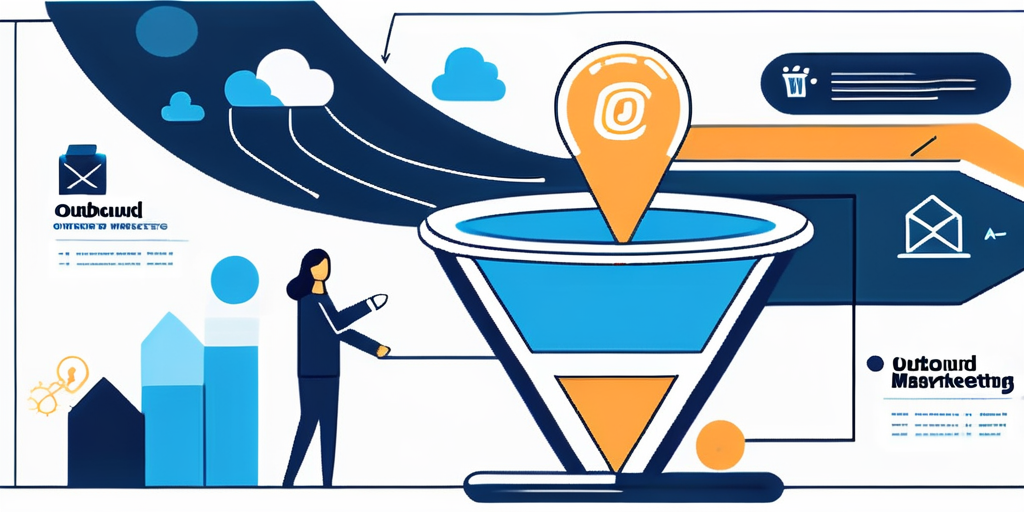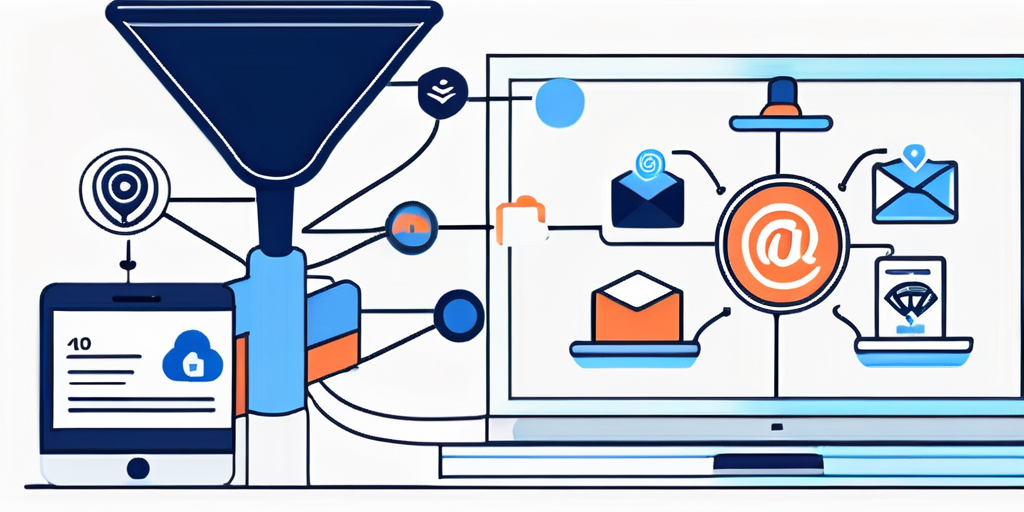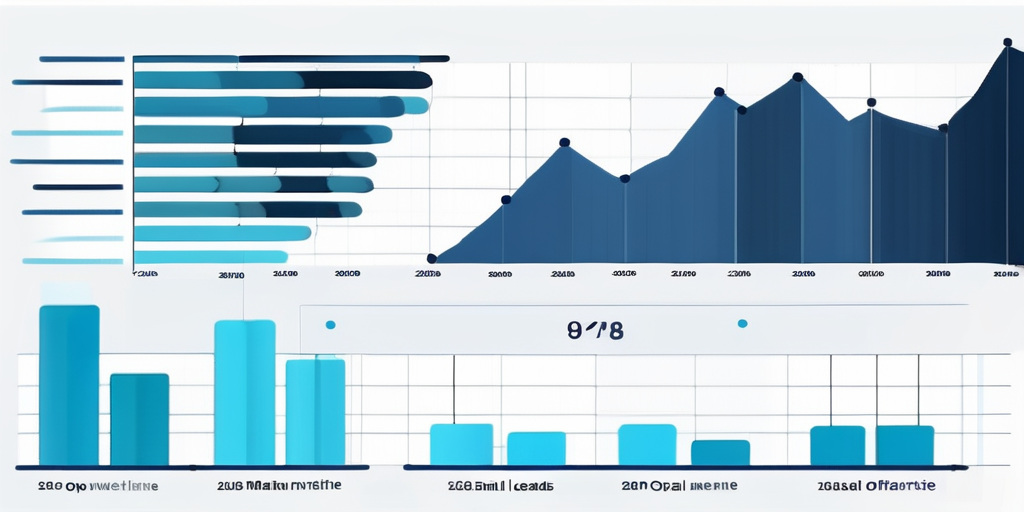In the digital age, the importance of generating website leads for small businesses cannot be overstated. The process of attracting potential customers to your website and converting them into leads is a crucial aspect of any successful online marketing strategy. This article delves into the concept of outbound marketing, one of the key strategies used in generating website leads.
Outbound marketing, often referred to as traditional marketing, involves reaching out to consumers directly to promote your products or services. This approach can be contrasted with inbound marketing, where businesses aim to attract customers by creating valuable content and experiences tailored to them. While both strategies have their merits, this article will focus on the role of outbound marketing in generating website leads.
Understanding Outbound Marketing
Outbound marketing is a proactive approach where businesses initiate the conversation with potential customers. This strategy involves pushing your message out to a broad audience, hoping to spark interest and attract leads. It’s often associated with traditional forms of advertising such as TV commercials, radio ads, print advertisements, and direct mail.

However, in the context of generating website leads, outbound marketing takes on a digital form. This includes strategies like email marketing, display ads, pay-per-click (PPC) advertising, social media ads, and cold outreach. The goal is to reach out to potential customers, draw them to your website, and convert them into leads.
The Role of Outbound Marketing in Lead Generation
Outbound marketing plays a vital role in lead generation. By reaching out to potential customers, businesses can directly communicate their value proposition, creating awareness and interest in their offerings. This can be particularly effective for small businesses looking to establish a foothold in the market.
Moreover, outbound marketing allows businesses to target specific demographics or market segments. By tailoring your message to a specific audience, you can increase the chances of attracting high-quality leads that are more likely to convert into customers.
Challenges of Outbound Marketing
While outbound marketing can be effective, it also presents certain challenges. One of the main criticisms of outbound marketing is that it can be intrusive. Consumers today are bombarded with advertising messages, leading to a phenomenon known as ad fatigue. This can make it more difficult for your message to stand out and resonate with your target audience.
Furthermore, outbound marketing can be expensive. Traditional advertising methods like TV and radio ads can be cost-prohibitive for small businesses. Even digital outbound marketing strategies like PPC advertising can quickly eat into your marketing budget if not managed effectively.
Strategies for Effective Outbound Marketing
Despite these challenges, outbound marketing can be a powerful tool for generating website leads when used effectively. The key is to develop a strategic approach that balances reach with relevance. This involves understanding your target audience, crafting compelling messages, and choosing the right channels to reach your audience.

Here are some strategies that small businesses can use to make their outbound marketing efforts more effective.
Targeted Email Marketing
Email marketing remains one of the most effective outbound marketing strategies for generating website leads. The key to successful email marketing is personalization. This involves segmenting your email list based on various factors like demographics, past purchases, and browsing behavior, and sending targeted emails that resonate with each segment.
Moreover, a well-crafted email can drive traffic to your website by including compelling calls-to-action (CTAs) that encourage recipients to visit your website to learn more about your offerings or take advantage of a special offer.
Pay-Per-Click Advertising
Pay-per-click (PPC) advertising is another powerful outbound marketing strategy for driving website leads. PPC ads appear in search engine results when users search for keywords related to your business. This can be an effective way to reach potential customers who are actively looking for the products or services you offer.
However, PPC advertising requires careful planning and management. It’s important to choose the right keywords, create compelling ad copy, and optimize your landing pages to convert visitors into leads. Moreover, you need to monitor your campaigns closely to ensure they’re delivering a good return on investment.
Measuring the Success of Your Outbound Marketing Efforts
Like any marketing strategy, it’s important to measure the success of your outbound marketing efforts. This involves tracking key metrics like click-through rates, conversion rates, and cost per lead. These metrics can provide valuable insights into the effectiveness of your strategies and help you make data-driven decisions to improve your lead generation efforts.

Moreover, it’s important to remember that outbound marketing is just one piece of the puzzle. A successful lead generation strategy involves a mix of outbound and inbound marketing tactics. By combining these approaches, you can reach a wider audience and generate more high-quality leads for your small business.
Conclusion
Outbound marketing remains a vital strategy for generating website leads, especially for small businesses. Despite the challenges, with the right approach, it can help you reach a wider audience, create awareness of your brand, and attract more potential customers to your website.
Remember, the key to successful outbound marketing is to balance reach with relevance. By understanding your target audience, crafting compelling messages, and choosing the right channels, you can make your outbound marketing efforts more effective and generate more high-quality leads for your business.
Frequently Asked Questions
What is Outbound Marketing?
Outbound marketing refers to traditional forms of marketing designed to initiate a conversation about a product or service by sending messages out to an audience. It’s often called “interruptive marketing” because it pushes the message out to consumers, regardless of whether they have expressed interest in the product or service. Common examples include television and radio advertising, print advertisements, telemarketing, cold calling, and email blasts.
How does Outbound Marketing differ from Inbound Marketing?
The key difference between outbound and inbound marketing lies in how customers are approached. Outbound marketing relies on broadcasting messages to a wide audience to generate leads, often without prior consent or interest from the audience. In contrast, inbound marketing focuses on creating quality content that pulls people toward your company and product, where they naturally want to be. While outbound marketing seeks to push messages out, inbound marketing aims to attract customers through relevant and helpful content.
Is Outbound Marketing still effective?
Yes, outbound marketing can still be effective, especially when used in combination with inbound marketing strategies. Its effectiveness depends on the target audience, the industry, and the type of product or service being marketed. For certain demographics or industries where digital presence is less pronounced, traditional outbound methods can be very effective. However, it’s important to carefully target campaigns and measure their performance to ensure a good return on investment.
What are the advantages of Outbound Marketing?
Outbound marketing offers several advantages, including:
- Broad Reach: It can expose your product or service to a large audience quickly, raising brand awareness.
- Targeted: Specific demographics can be targeted through certain channels (e.g., industry magazines, TV channels).
- Immediate Impact: Outbound campaigns can be launched quickly and generate immediate responses.
- Control: Marketers have full control over the message, timing, and medium of their marketing campaigns.
How can businesses make Outbound Marketing more effective?
To enhance the effectiveness of outbound marketing, businesses can:
- Segment and Target: Carefully segment the market and target your campaigns to the most relevant audiences to improve response rates.
- Personalize Messages: Tailor messages to meet the needs and interests of the target audience to increase engagement.
- Integrate with Inbound Strategies: Use outbound marketing to complement inbound efforts, directing prospects to your digital content.
- Measure and Adjust: Continuously measure the performance of outbound campaigns and adjust strategies based on data to improve ROI.
- Stay Compliant: Ensure that all outbound marketing activities comply with legal regulations and ethical standards, such as those governing telemarketing and email marketing.
Still unsure about Contact Button?
3 reasons to give it a try
- Start at no cost with our Basic Plan. We'll even help install your first button for free!
- Our all-in-one widget will make your website easier to use and help you capture more leads.
- All your existing website plugins, apps, and menus will still work after you install a Contact Button, so it can be easily removed if you no longer want it.
Basic Plan
Free
Good for websites with fewer than 1,000 visitors per month
- Up to 10 New Leads per Month
- Up to 100 Monthly Button Clicks
- Use Custom Google Fonts
- Hide Contact Button Branding
- Embed Your Own Affiliate Link
Max Plan
$10
Remove monthly lead & click limits and Contact Button branding
- Unlimited Monthly Leads
- Unlimited Button Clicks
- Use Custom Google Fonts
- Hide Contact Button Branding
- Embed Your Own Affiliate Link